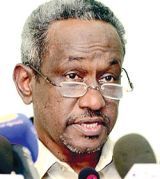Sudan opposes UN force for Darfur even after September – Taha
March 14, 2006 (KHARTOUM) — Sudan will reject the proposed deployment of U.N. forces to Darfur after the African Union’s peacekeeping mandate expires in September, Vice President Ali Osman Mohammed Taha told reporters Tuesday, according to the official Sudan Media Center.
 His comment conflicts with the agreement announced in Addis Ababa on Friday, when Sudan and the African Union agreed to extend the mandate of the A.U. peacekeepers in Darfur to September, and then allow them to be merged into a larger United Nations force.
His comment conflicts with the agreement announced in Addis Ababa on Friday, when Sudan and the African Union agreed to extend the mandate of the A.U. peacekeepers in Darfur to September, and then allow them to be merged into a larger United Nations force.
The Khartoum government has long opposed a U.N. force replacing the A.U. mission in Darfur, western Sudan, where a three-year conflict has led to the death of at least 300,000 people and the displacement of another 2 million.
However, world powers such as the U.S. and the European Union have been pushing for a big U.N. mission in Darfur, believing that the 7,000 personnel of the A.U. force were too thin on the ground to bring a halt to the violence and protect the humanitarian agencies distributing relief.
Under Friday’s deal, the A.U. mission, which is due to expire this month, was extended through Sept. 30, when it would be succeeded by a U.N. force. The agreement gives more time both for the government and Darfur rebels to negotiate peace, and for the U.N. to prepare a large peacekeeping force.
Referring to the U.N. force, Taha was quoted by the official media center as saying: “Sudan’s stand is to reject those forces even when the period of six months has elapsed.”
He did not explain how the government reconciled that position with its acceptance of the Addis Ababa accord.
Taha also said that when he met the Darfur rebel leaders in Libya, he felt they had a “real desire to reach a peace agreement.”
He did not say which rebel leaders he met and when the meeting took place.
The A.U. is pushing both the government and the rebels to reach a settlement in the peace talks in Abuja, Nigeria, by April 30.
The conflict began in February 2003 when members of Darfur’s ethnic African population took up arms against the government, accusing it of neglect and discrimination. The Arab-dominated government is alleged to have responded by unleashing Arab militias, who carried out sweeping atrocities against ethnic African villagers.
(ST/AP)
